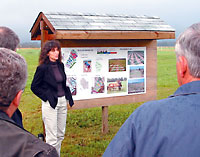State agriculture board meets at, tours, Cherry Farm
By Sam Atkins
Published in News on April 1, 2004 2:02 PM
Providing farmers with economically viable ways to plant crops and raise cattle is just one goal of the Center for Environmental Farming Systems in Goldsboro.
It also is teaching young, bright future farmers what is involved in cultivating the land.
Many people are unfamiliar with the 2,200 acres that make up the center near Cherry Hospital. But on Wednesday a few more people became familiar with the research farms, as the N.C. Board of Agriculture decided to hold its meeting there.

News-Argus/Sam Atkins
Dr. Nancy Creamer, director of the Center for Environmental Farming Systems program with N.C. State University, explains the five different research systems at Cherry Research Farms in Goldsboro. She is addressing members of the N.C. Board of Agriculture, who met here on Wednesday.
"It's completely unique in the southern region," said Dr. Nancy Creamer, director of the center's programs at N.C. State University.
She said the plan is to put more farmers on the land, help them get closer to consumers and provide them with useful information on ways to cultivate the land.
The center was established in 1994 at Cherry Research Farms, which was originally part of Cherry Hospital. Many of the center's projects are funded through grants.
Wednesday was the first time the Agriculture Board had met outside of Raleigh in a long time, said Britt Cobb, board chairman and N.C. Commissioner of Agriculture. The board hopes to continue to meet at other sites across the state.
The board's first stop was the 200-acre systems research area. The five systems that are being evaluated are a plantation forestry, integrated crop and animal production systems, an organic farm, a cash-grain cropping system and a successful ecosystem.
Data is collected on the systems' soil and water quality, pests and predators, and other issues that affect a farm, said Ms. Creamer.
Board members then traveled to the center's dairy and beef cattle grazing operations and the organic farming operation.
Dr. Steve Washburn, the center's dairy project coordinator, said the dairy operation received a portion of a $226,903 grant from the USDA. The money was divided among the center, Virginia Tech University and Clemson University over a three-year period.
The center will use the money to evaluate how stocking rates, or the number of cows per acre on the farm, affect milk quality, environmental health and finances.
A $600,000 grant by the W.K. Kellogg Foundation has also been approved to help provide a model for alternative food systems for hogs. The center will work with N.C. State University to help develop the model, which will be used for teaching, extension, research and marketing efforts, said Eddie Pitzer, the center's superintendent.
Another grant established a student intern program. The center usually has around 20 students from all over the country participate in the eight-week internship. The students gain practical experience on farming, marketing commodities and research, and they get six academic credits for participating, said Pitzer.
After the tour, the board gathered to hold its business meeting. The board has 10 members who are appointed by the governor and is a policy and rule-making body.
It approved increasing rental fees at the five state-owned farmers markets, which are in Asheville, Charlotte, Colfax, Lumberton and Raleigh. The increases took effect Jan. 1, but one man who has been selling produce at the Raleigh market for 33 years approached the board during the meeting with his concerns.
Billy Jones with Jones Fruit and Produce had been paying $3 per day to rent space, but now has to pay $10 per day. He asked the board to hold off on the increase until the market tenants decide on a fee that is suitable for everybody.
"It's just ridiculous," he said.
